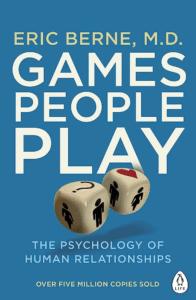The Unseen Scripts: Deconstructing Human Relationships in Eric Berne’s “Games People Play”

Eric Berne’s seminal work, “Games People Play: The Psychology of Human Relationships,” published in 1964, remains a groundbreaking exploration into the often-unconscious patterns that govern our interactions. More than just a catalog of social behaviors, Berne’s book offers a profound and accessible framework for understanding the hidden agendas, repetitive scripts, and psychological payoffs that shape our relationships, often leading to predictable and sometimes destructive outcomes. By introducing the concepts of transactional analysis, ego states, and the titular “games,” Berne illuminated the subtle yet powerful forces at play beneath the surface of everyday communication.
The Tripartite Self: Ego States in Transactional Analysis
At the heart of Berne’s theory lies the idea that individuals operate from one of three ego states: the Parent, the Adult, and the Child. The Parent ego state embodies the internalized attitudes and behaviors of authority figures, often expressed as nurturing or critical pronouncements. The Adult ego state represents rational, logical thinking, focused on objective reality and problem-solving. Finally, the Child ego state encompasses the emotions, impulses, and experiences of our childhood, manifesting as either free and playful or adapted and compliant behaviors. According to Berne, every interaction, or “transaction,” involves an exchange between these ego states. Healthy communication occurs when transactions are complementary, such as an Adult addressing another Adult. However, many interactions become complicated and unproductive when these states clash or when ulterior motives are involved.
Unmasking the Games: Hidden Agendas in Interaction
This leads to Berne’s central concept: psychological “games.” These are not casual pastimes but rather a series of complementary ulterior transactions progressing to a well-defined, predictable outcome. These games are characterized by a concealed motivation; on the surface, the interaction appears plausible, but beneath it lies a hidden agenda that often results in negative feelings or “payoffs” for the players involved. Berne meticulously catalogues a variety of these games, giving them catchy and often cynical titles like “Why Don’t You – Yes, But,” “Now I’ve Got You, You Son of a Bitch,” and “If It Weren’t For You.” Each game, through its predictable sequence of moves and the roles adopted by the participants (often unconsciously), serves a psychological function, such as avoiding intimacy, seeking validation, or reinforcing negative self-perceptions.
“Why Don’t You – Yes, But”: An Illustrative Game
Consider the game of “Why Don’t You – Yes, But.” In this scenario, one person presents a problem and solicits advice (“Why don’t you…?”). However, for every suggestion offered, they provide a reason why it won’t work (“Yes, but…”). The overt goal is to find a solution, but the covert aim is often to elicit sympathy and prove that their problem is insurmountable. The payoff for the “player” is the reinforcement of their victim stance and the frustration of the advice-givers. By identifying such patterns, Berne empowers individuals to recognize when they and others are engaging in these unproductive cycles.
Accessibility and Impact: Reaching a Wider Audience
The beauty and impact of “Games People Play” lie in its ability to make complex psychological concepts accessible to a wide audience. Berne’s use of clear language, relatable examples, and even a touch of dark humor allows readers to identify these games in their own lives and the interactions of those around them. The book serves as a powerful tool for self-awareness, prompting introspection into the underlying motivations behind our social behaviors. By understanding the games we play, we gain the potential to break free from these repetitive patterns and move towards more authentic and fulfilling relationships based on genuine Adult-Adult interactions.
Criticisms and Enduring Legacy: A Balanced Perspective
However, “Games People Play” is not without its critics. Some have argued that Berne’s model oversimplifies the complexities of human behavior and that his categorization of games can be somewhat rigid. Additionally, the terminology, while often evocative, can sometimes feel reductive. Nevertheless, the book’s enduring popularity and influence speak to its profound insights into the dynamics of social interaction. It provided a fresh perspective on psychotherapy and interpersonal communication, shifting the focus from purely intrapsychic processes to the observable patterns of relating.
Conclusion: Towards Authentic Engagement
In conclusion, Eric Berne’s “Games People Play” remains a vital contribution to our understanding of human relationships. By unveiling the hidden scripts and unconscious motivations that drive our interactions, Berne offered a powerful framework for recognizing and potentially transcending unproductive patterns. The concepts of ego states and psychological games have permeated popular culture and continue to provide valuable insights into the intricate dance of human connection. While not a definitive answer to all relational complexities, “Games People Play” serves as a compelling and enduring guide for navigating the often-uncharted territory of our social lives, encouraging us to become more aware of the games we play and to strive for more genuine and authentic engagement with one another.











